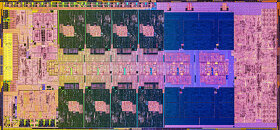- Joined
- Oct 9, 2007
- Messages
- 47,621 (7.44/day)
- Location
- Dublin, Ireland
| System Name | RBMK-1000 |
|---|---|
| Processor | AMD Ryzen 7 5700G |
| Motherboard | Gigabyte B550 AORUS Elite V2 |
| Cooling | DeepCool Gammax L240 V2 |
| Memory | 2x 16GB DDR4-3200 |
| Video Card(s) | Galax RTX 4070 Ti EX |
| Storage | Samsung 990 1TB |
| Display(s) | BenQ 1440p 60 Hz 27-inch |
| Case | Corsair Carbide 100R |
| Audio Device(s) | ASUS SupremeFX S1220A |
| Power Supply | Cooler Master MWE Gold 650W |
| Mouse | ASUS ROG Strix Impact |
| Keyboard | Gamdias Hermes E2 |
| Software | Windows 11 Pro |
Intel has identified the root cause for stability issues being observed with certain high-end 13th- and 14th Gen Core "Raptor Lake" processor models, which were causing games and other compute-intensive applications to randomly crash. When the issues were first identified, Intel recommended a workaround that would reduce core-voltages and restrict the boost headroom of these processors, which would end up with reduced performance. The company has apparently discovered the root cause of the problem, as Igor's Lab learned from confidential documents.
The documents say that Intel isolated the problem to a faulty value in the microcode's end of the eTVB (enhanced thermal velocity boost) algorithm. "Root cause is an incorrect value in a microcode algorithm associated with the eTVB feature. Implication Increased frequency and corresponding voltage at high temperature may reduce processor reliability. Observed Found internally," the document says, mentioning "Raptor Lake-S" (13th Gen) and "Raptor Lake Refresh-S" (14th Gen) as the affected products.

The company goes on to elaborate on the issue in its Failure Analysis (FA) document:
Identifying the root cause of the problem isn't the only good news, Intel also has a new microcode ready for 13th Gen and 14th Gen Core processors (version: 0x125), for motherboard manufacturers and PC OEMs to encapsulate into UEFI firmware updates. This new microcode corrects the issue, which should restore stability of these processors at their normal performance. Be on the lookout for UEFI firmware (BIOS) updates from your motherboard vendor or prebuilt OEM.
View at TechPowerUp Main Site | Source
The documents say that Intel isolated the problem to a faulty value in the microcode's end of the eTVB (enhanced thermal velocity boost) algorithm. "Root cause is an incorrect value in a microcode algorithm associated with the eTVB feature. Implication Increased frequency and corresponding voltage at high temperature may reduce processor reliability. Observed Found internally," the document says, mentioning "Raptor Lake-S" (13th Gen) and "Raptor Lake Refresh-S" (14th Gen) as the affected products.

The company goes on to elaborate on the issue in its Failure Analysis (FA) document:
Failure Analysis (FA) of 13th and 14th Generation K SKU processors indicates a shift in minimum operating voltage on affected processors resulting from cumulative exposure to elevated core voltages. Intel analysis has determined a confirmed contributing factor for this issue is elevated voltage input to the processor due to previous BIOS settings which allow the processor to operate at turbo frequencies and voltages even while the processor is at a high temperature. Previous generations of Intel K SKU processors were less sensitive to these type of settings due to lower default operating voltage and frequency.
Identifying the root cause of the problem isn't the only good news, Intel also has a new microcode ready for 13th Gen and 14th Gen Core processors (version: 0x125), for motherboard manufacturers and PC OEMs to encapsulate into UEFI firmware updates. This new microcode corrects the issue, which should restore stability of these processors at their normal performance. Be on the lookout for UEFI firmware (BIOS) updates from your motherboard vendor or prebuilt OEM.
View at TechPowerUp Main Site | Source








